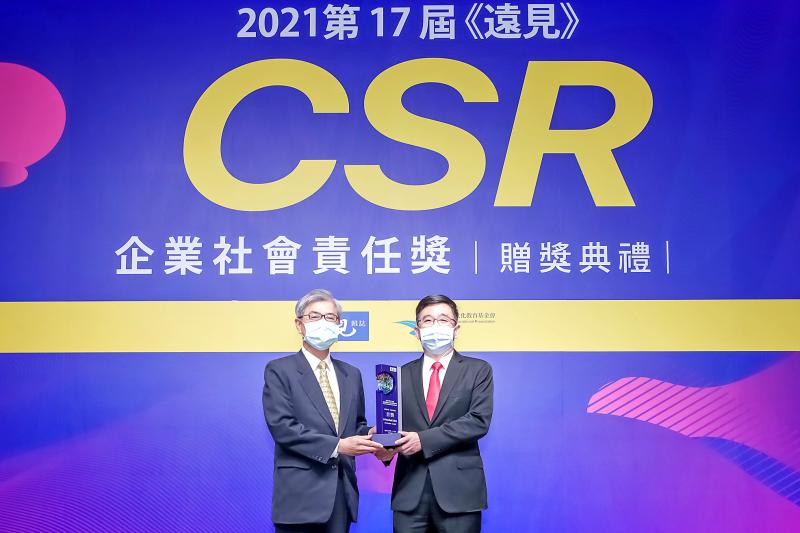HSBC Bank Taiwan Ltd (匯豐台灣商銀) plans to adopt several approaches to build a happy workplace for its employees, chief executive officer Adam Chen (陳志堅) said yesterday.
Chen’s comment came after the bank ranked first among all domestic companies to win Chinese-language Global Views Monthly magazine’s Happy Enterprise Award on Monday.
“We can only be cheerful about winning the prize for a short moment, as creating a pleasant work environment is an ongoing journey and we cannot relax and stop,” Chen told the Taipei Times in a telephone interview yesterday.

Photo courtesy of HSBC
The magazine said that HSBC Bank Taiwan’s flexible working arrangements was one of the reasons it was a happy enterprise.
Chen said that the bank would continue its flexible working arrangement even after the COVID-19 pandemic ends.
FLEXIBILITY
“We allow employees great flexibility on where and when they want to do their jobs; they can start working early to get off early or choose to work from home. It is the quality of output that we focus on, not the process,” Chen said.
Although some entrepreneurs think flexitime reduces productivity, Chen disagreed, saying it is important to believe in the good of human nature.
“We have demands about the quality of their work, but we also offer business tools such as a computer for each employee so that they can reach each other using computer software, not phones. The staff has no problem in maintaining their productivity,” Chen said.
Another approach to creating a happy workplace is to make improvements based on staff proposals, so the bank has a staff engagement club and Chen routinely meets with employees to listen to their voices, he said.
Staff proposals range from the light-hearted ones, such as birthday celebrations for colleagues and snack choices for Friday afternoon, to serious ones, such as the need for office computer updates, Chen said.
To ensure that employees are satisfied with the bank’s policies, Chen also asks all section managers to find out if staff have any issues, and if they do, managers must report to him to discuss what can be done, he said.
The bank’s parent company, HSBC Holdings PLC, asks all of its units’ staff to file an anonymous employee survey once every six months, and compares the results across different countries and continents, Chen said.
The survey questions cannot be disclosed, but are mainly used to measure whether staff are confident or happy with the company’s policy and strategy, he said.
DIVERSITY
HSBC values its employees’ differences regarding their age, gender and cultural background, Chen said, adding that the bank aims to boost its LGBT-friendly policies.
The bank offers spouse benefits to employees’ partners and would be relaxing some basic rules to benefit staff more, he added.

Three experts in the high technology industry have said that US President Donald Trump’s pledge to impose higher tariffs on Taiwanese semiconductors is part of an effort to force Taiwan Semiconductor Manufacturing Co (TSMC, 台積電) to the negotiating table. In a speech to Republicans on Jan. 27, Trump said he intends to impose tariffs on Taiwan to bring chip production to the US. “The incentive is going to be they’re not going to want to pay a 25, 50 or even a 100 percent tax,” he said. Darson Chiu (邱達生), an economics professor at Taichung-based Tunghai University and director-general of

Hon Hai Precision Industry Co (鴻海精密) is reportedly making another pass at Nissan Motor Co, as the Japanese automaker's tie-up with Honda Motor Co falls apart. Nissan shares rose as much as 6 percent after Taiwan’s Central News Agency reported that Hon Hai chairman Young Liu (劉揚偉) instructed former Nissan executive Jun Seki to connect with French carmaker Renault SA, which holds about 36 percent of Nissan’s stock. Hon Hai, the Taiwanese iPhone-maker also known as Foxconn Technology Group (富士康科技集團), was exploring an investment or buyout of Nissan last year, but backed off in December after the Japanese carmaker penned a deal

WASHINGTON POLICY: Tariffs of 10 percent or more and other new costs are tipped to hit shipments of small parcels, cutting export growth by 1.3 percentage points The decision by US President Donald Trump to ban Chinese companies from using a US tariff loophole would hit tens of billions of dollars of trade and reduce China’s economic growth this year, according to new estimates by economists at Nomura Holdings Inc. According to Nomura’s estimates, last year companies such as Shein (希音) and PDD Holdings Inc’s (拼多多控股) Temu shipped US$46 billion of small parcels to the US to take advantage of the rule that allows items with a declared value under US$800 to enter the US tariff-free. Tariffs of 10 percent or more and other new costs would slash such

‘LEGACY CHIPS’: Chinese companies have dramatically increased mature chip production capacity, but the West’s drive for secure supply chains offers a lifeline for Taiwan When Powerchip Technology Corp (力晶科技) entered a deal with the eastern Chinese city of Hefei in 2015 to set up a new chip foundry, it hoped the move would help provide better access to the promising Chinese market. However, nine years later, that Chinese foundry, Nexchip Semiconductor Corp (合晶集成), has become one of its biggest rivals in the legacy chip space, leveraging steep discounts after Beijing’s localization call forced Powerchip to give up the once-lucrative business making integrated circuits for Chinese flat panels. Nexchip is among Chinese foundries quickly winning market share in the crucial US$56.3 billion industry of so-called legacy